-
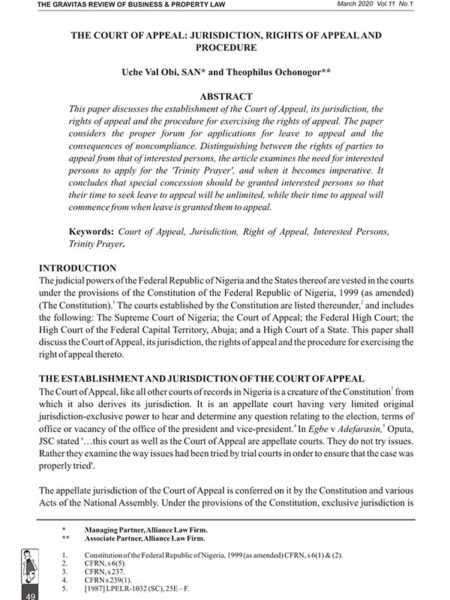
The Court of Appeal: Jurisdiction, Rights of Appeal and Procedure
0₦2,500.00Uche Val Obi, SAN and Theophilus Ochonogor of the Alliance Law Firm in their article, The Court of Appeal: Jurisdiction, Rights of Appeal and Procedure, examine the jurisdiction, rights of appeal and procedure of the Court of Appeal. They consider intriguing issues including appeals by interested persons, whether there is a time limit within which an applicant may seek leave to appeal as an interested party, whether an interested party is exempted from seeking the ‘trinity prayers’ and whether an applicant seeking to appeal as an interested party is to approach the trial high court or the Court of Appeal in the first instance.
-
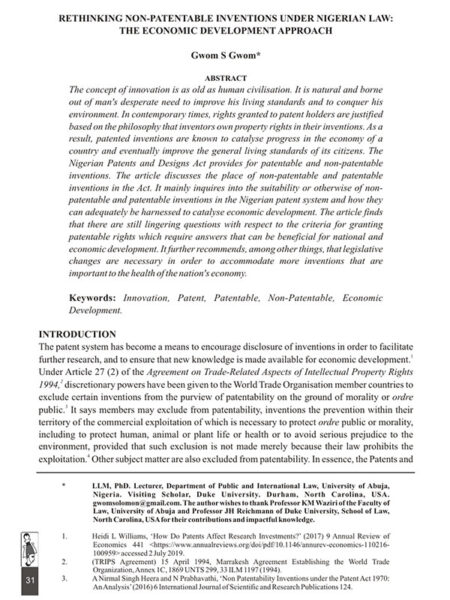
Rethinking Non-Patentable Inventions under Nigerian Law: The Economic Development Approach
0₦2,500.00Dr Gwom Gwom of the Department of Public and International Law, University of Abuja Nigeria in his article, Rethinking Non-Patentable Inventions under Nigerian Law: The Economic Development Approach, reviews the legal and regulatory regime of Patents in Nigeria. He examines the criteria for patentability of an invention; inquire into the suitability or otherwise of patentable and non-patentable inventions in the Nigerian Patent System; posit that there are still lingering questions with respect to the criteria for granting patentable rights which require answers that can be beneficial for national and economic development; and conclude that legislative changes are necessary in order to accommodate more inventions that are important to the health of the nation’s economy.
-
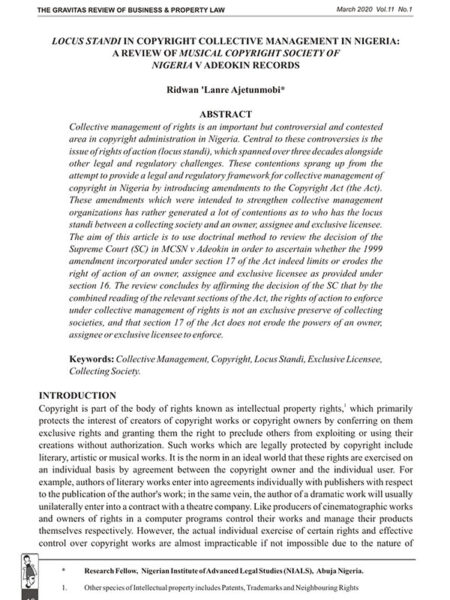
Locus Standi in Copyright Collective Management in Nigeria: A Review of Musical Copyright Society of Nigeria v Adeokin Records
0₦2,500.00Ridwan Ajetunmobi, Research Fellow at the Nigerian Institute of Advanced Legal Studies Abuja Nigeria, in Locus Standi in Copyright Collective Management in Nigeria: A Review of Musical Copyright Society of Nigeria v Adeokin Records, examines the Supreme Court decision in Adeokin against the background of the amendments to the Copyright Act in 1992 and 1999 with regard to whether the right of action in copyright infringement is exclusive to collecting societies or is available to an owner, assignee or licensee of copyrighted works.
-
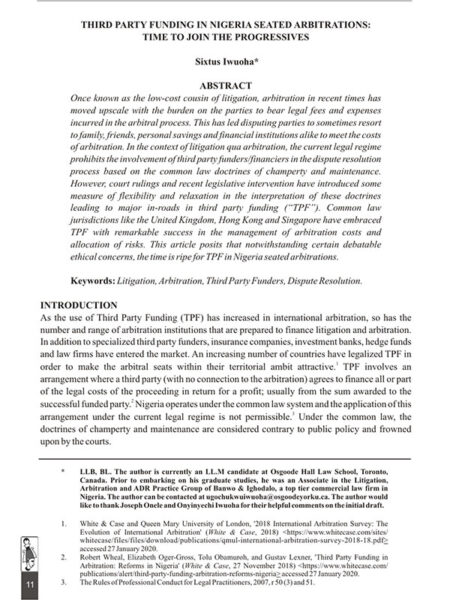
Third-Party Funding in Nigeria Seated Arbitrations: Time To Join The Progressives
0₦2,500.00Sixtus Iwuoha, formerly of Banwo & Igholado and now of the Osgoode Hall Law School, Toronto Canada, in his article, Third-Party Funding in Nigeria Seated Arbitrations: Time To Join The Progressives, posits that Arbitration, once known as the low-cost cousin of litigation, has moved upscale with a heavy burden on the parties to bear legal fees and expenses incurred in the arbitral process. This has led disputing parties to sometimes resort to family, friends, personal savings and financial institutions alike to meet the costs of arbitration. In the context of litigation qua arbitration, Nigeria’s current legal regime prohibits the involvement of third-party funders/financiers in the dispute resolution process based on the common law doctrines of champerty and maintenance. However, court rulings and recent legislative intervention have introduced some measure of flexibility and relaxation in the interpretation of these doctrines leading to major in-roads in third party funding TPF in jurisdictions like the United Kingdom, Hong Kong and Singapore. Sixtus concludes that notwithstanding certain debatable ethical concerns, the time is ripe for TPF in Nigeria seated arbitrations.
-
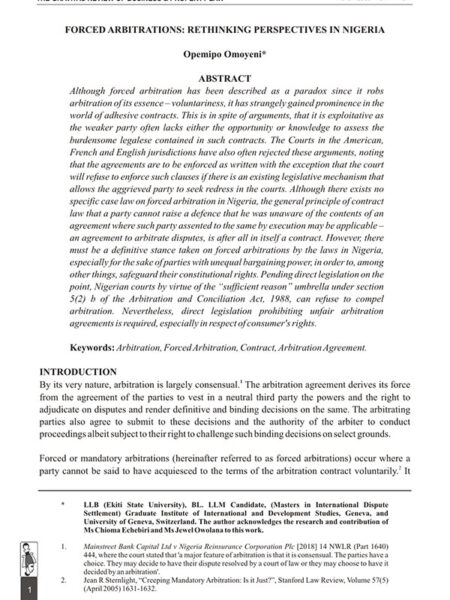
Forced Arbitrations: Rethinking Perspectives in Nigeria
0₦2,500.00Opemipo Omoyeni of the Graduate Institute of International and Development Studies Geneva Switzerland in his article, Forced Arbitrations: Rethinking Perspectives in Nigeria, considers the concept of Forced or Mandatory Arbitration which occurs mostly in standard form contracts where a party cannot be said to have acquiesced to the terms of the arbitration contract voluntarily. Omoyeni examines the state of the law in Nigeria, the United States of America, and the United Kingdom. Omoyeni posits that Forced Arbitration may work an injustice on the weaker party in an uneven bargaining position who is compelled to arbitrate his dispute while lacking the financial capacity or wherewithal to arbitrate, and who as well cannot be said to have given real consent to do so. He concludes with the need for legislation and the courts’ intervention to protect the weaker party.
-
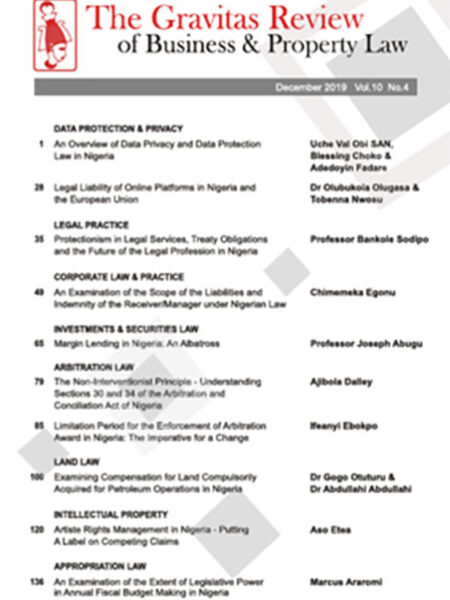
The Gravitas Review of Business & Property Law Vol.10 No.4 – Print
0₦5,000.00In this issue of The Gravitas Review of Business & Property Law Vol.10 No.4, there are well researched articles on:
- Data Protection & Privacy
- Legal Practice
- Corporate Law & Practice
- Investments & Securities Law
- Arbitration Law
- Land Law
- Intellectual Property
- Appropriation Law
-

The Gravitas Review of Business & Property Law Vol.10 No.4 – E-Book
0₦5,000.00In this issue of The Gravitas Review of Business & Property Law Vol.10 No.4, there are well researched articles on:
- Data Protection & Privacy
- Legal Practice
- Corporate Law & Practice
- Investments & Securities Law
- Arbitration Law
- Land Law
- Intellectual Property
- Appropriation Law
-

The Gravitas Review of Business & Property Law Vol.10 No.4
0₦5,000.00In this issue of The Gravitas Review of Business & Property Law Vol.10 No.4, there are well researched articles on:
- Data Protection & Privacy
- Legal Practice
- Corporate Law & Practice
- Investments & Securities Law
- Arbitration Law
- Land Law
- Intellectual Property
- Appropriation Law
-
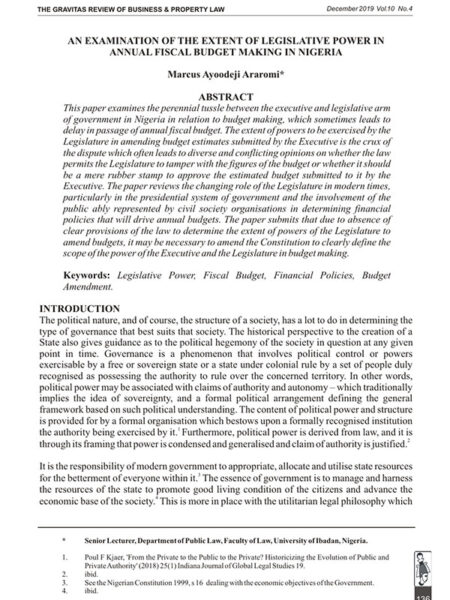
An Examination of the Extent of Legislative Power in Annual Fiscal Budget Making in Nigeria
0₦2,500.00Marcus Araromi, Senior Lecturer at the University of Ibadan, Nigeria in, An Examination of the Extent of Legislative Power in Annual Fiscal Budget Making in Nigeria, contributes to the debate on the extent of the power of the National Assembly to tinker with the budget estimates submitted to it by the Executive. The crux of the perennial disputes between the Legislature and the Executive has been whether the law permits the Legislature to tamper with the figures of the budget or whether it should be a mere rubber stamp to approve the estimated budget submitted to it by the Executive. Araromi reviews the changing role of the Legislature in modern times and the compelling logic of the proponents of the opposing views. He concludes that there is an absence of explicit provisions in the law enabling the Legislature to amend budgets and it is necessary to amend the Constitution to clearly define the scope of the power of the Executive and the Legislature in budget making.
-
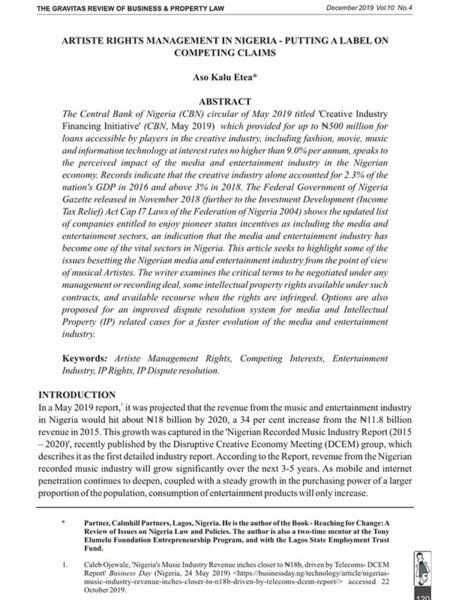
Artiste Rights Management in Nigeria – Putting A Label on Competing Claims
0₦2,500.00Aso Etea, Partner, Calmhill Partners, Lagos Nigeria in his article, Artiste Rights Management in Nigeria – Putting A Label on Competing Claims, reflects on the state of, and issues besetting, the creative industry in Nigeria. He graphically depicts ‘the making and breaking of careers’ of some artistes and what they ought to have done better. Aso examines the critical terms to be negotiated under any management or recording deal, intellectual property rights available under such contracts, and available recourse when the rights are infringed. He proposes an improved dispute resolution system for media and Intellectual Property (IP) related cases for faster evolution of the industry.
-
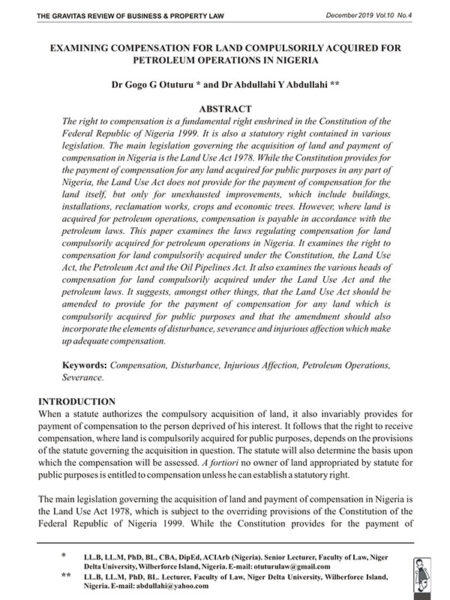
Examining Compensation for Land Compulsorily Acquired for Petroleum Operations in Nigeria
0₦2,500.00Dr Gogo Otuturu and Dr Abdullahi Abdullahi of the Faculty of Law, Niger Delta University, Wilberforce Island Nigeria in their article, note that the right to compensation for land compulsorily acquired is both a constitutional and statutory right. While the Constitution provides for the payment of compensation for any land acquired for public purposes, the Land Use Act provides for compensation, not for the land itself, but for unexhausted improvements. Where the land is acquired for petroleum operations, compensation is payable in accordance with the Petroleum Act and the Oil Pipelines Act. Otuturu and Abdullahi examine the various heads of compensation for land compulsorily acquired under the Land Use Act and the petroleum . They suggest an amendment of the laws to incorporate the elements of disturbance, severance and injurious affection.
-
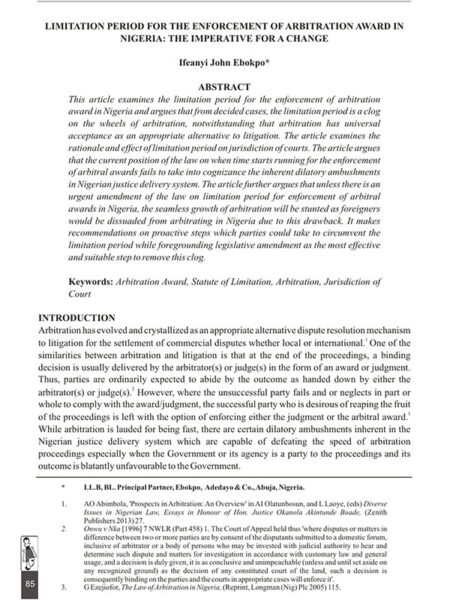
Limitation Period for the Enforcement of Arbitration Award in Nigeria: The Imperative for Change
0₦2,500.00Ifeanyi Ebokpo, Principal Partner, Ebokpo & Adedayo & Co Abuja Nigeria in his article,Limitation Period for the Enforcement of Arbitration Award in Nigeria: The Imperative for Change, examines the several modes and mechanisms for the recognition and enforcement of arbitral awards in Nigeria. He posits that the current position of the law on when time starts running for the enforcement of arbitral awards fails to take into cognizance the inherent dilatory processes in Nigerian justice delivery system. He advocates a change in the law so that the obvious drawback will not stunt the growth of arbitration.
The Gravitas Review of Business & Property Law



